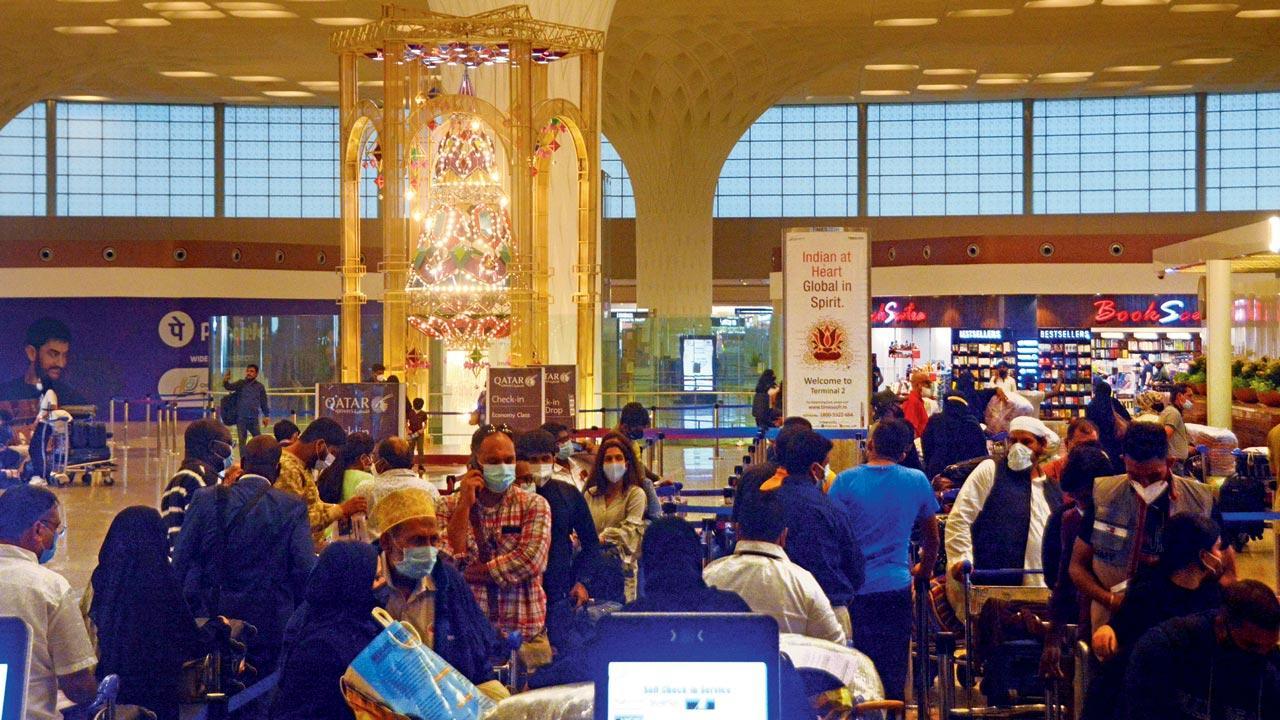If they are meant to give visitors a first glimpse of what a country stands for, shouldn’t we take them more seriously?

For everything the Mumbai international airport does right, there are things it can and ought to do better. File pic/Satej Shinde
 A friend of mine recently had one of the nicest experiences at an immigration counter. This occurred at the international airport in Bombay, while he was waiting for an officer to stamp his passport and allow him through the gates. The officer in question was being served a cutting of chai, that quintessential shot of sugar, tea and milk that has long been offered at street corners across the city. He accepted his tiny cup, then insisted that my friend have one too. There they were, on opposite sides of a glass partition, raising their cups and smiling. The story made me smile too.
A friend of mine recently had one of the nicest experiences at an immigration counter. This occurred at the international airport in Bombay, while he was waiting for an officer to stamp his passport and allow him through the gates. The officer in question was being served a cutting of chai, that quintessential shot of sugar, tea and milk that has long been offered at street corners across the city. He accepted his tiny cup, then insisted that my friend have one too. There they were, on opposite sides of a glass partition, raising their cups and smiling. The story made me smile too.
ADVERTISEMENT
I haven’t always had the most pleasant experiences at immigration counters. A majority of officers are polite, professional and kind, but there have also been a few who have struggled with bad days, who have taken it out on the visitors they are tasked with processing. I don’t mind when that happens because we are all human, but I do mind when an airport stops being a place of welcome and starts to become a symbol of what isn’t right with a place.
Consider a place like Bali airport where one is, more often than not, accosted by touts selling prepaid phone cards the minute one steps out of immigration. Or Jordan, where Indian passport-holders are routinely held back and questioned simply because their document isn’t as powerful as our government proclaims it to be. What these airports do is send the wrong kind of message about the places they are meant to represent and protect. They create indelible impressions that colour the views of visitors for years.
For everything the international airport in Bombay does right, there are things it can and ought to do better, starting with the way passengers are made to walk the longest walkway in the world as soon as they disembark from an aeroplane. Who in their right mind would make an exhausted long-haul traveller walk a mile and a half to get to an immigration counter, I ask, time and again, whenever I am forced to make that trek? There are buggies meant to help anyone who needs assistance, but coming across one of them is like playing the lottery. You never know if one is going to be around when you need it. The feeling one is left with is of insensitivity, which makes for a bad first impression.
Then there is the customs department, that perennially inscrutable place where some unsmiling man will insist on checking all bags or no bags depending upon his whim. This is where helpers ask for money to help you place X-rayed bags back on trolleys, or where you have to second guess whether the pouch across your shoulders will be checked or not. Everyone is treated as a potential drug smuggler, and one inadvertently walks away with a bitter taste.
Finally, it’s the last stage where the airport always fails—that spot from where you’re meant to start your journey home. To try and get a prepaid cab here depends upon luck, because you may find an attendant happy to help, or eager to gouge. You can see it on the faces of pale white tourists who know they are being scammed but also know they can do nothing about it. It is the sort of experience that makes visitors believe they have stepped into a country of con artists, because they are treated less as tired guests and more like potential meal tickets.
Getting an Ola or Uber isn’t any easier, because the airport clearly doesn’t believe that traffic management falls under its purview. Hidden from the public, in the bowels of the airport building, hundreds of passengers struggle to find their designated vehicle every hour, pushing trolleys through a mass of other people in the hope that their cab driver will still be around when they get through the chaos. It doesn’t have to be this way, but has stayed the same for years nonetheless, presumably because no one has thought to try and fix the problem.
These complaints may sound petty, but I believe they should be addressed because they form part of a systemic issue that plagues all modes of transport across India. People deserve to be treated better. We need to unlearn everything we think we know about travel and start treating guests with respect. When we don’t, we let ourselves down, and give outsiders a picture of an India that is cruel, heartless and ugly.
When he isn’t ranting about all things Mumbai, Lindsay Pereira can be almost sweet. He tweets @lindsaypereira
Send your feedback to [email protected]
The views expressed in this column are the individual’s and don’t represent those of the paper
 Subscribe today by clicking the link and stay updated with the latest news!" Click here!
Subscribe today by clicking the link and stay updated with the latest news!" Click here!







